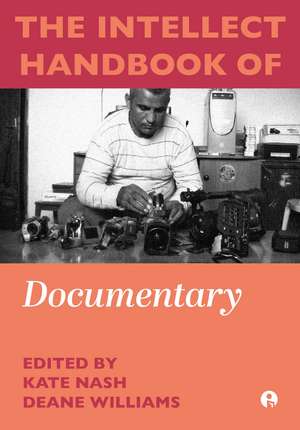The Intellect Handbook of Documentary
Editat de Kate Nash, Deane Williamsen Limba Engleză Hardback – 12 apr 2025
The Intellect Handbook of Documentary is an important go-to resource for practitioners, scholars, and students in this burgeoning field. It tackles key topics and debates including the role of documentary in post-truth culture, the rise of streaming giants, and the implications for national documentary cultures, as well as the shifting, increasingly hybrid, practices of documentary activism and the professionalization of impact. Featuring work by key figures in international documentary scholarship and talented emerging scholars, the Handbook is a landmark publication for documentary studies in the twenty-first century.
The Handbook is broad in its scope, incorporating historical, theoretical, empirical, and practical scholarship. It is organized around ten key themes and debates: What and where is documentary (studies); documentary in an age of epistemic uncertainty; documentary histories; documentary and the archive; audio and visualities; documentary relationalities; beyond the Anthropocene; digital and documentary practices; documentary and (new) politics; and a golden age of documentary distribution and funding. Importantly, the Handbook incorporates the voices and practices of practitioners from the Global South, challenging the dominance of Western voices in documentary scholarship.
Preț: 878.40 lei
Preț vechi: 1140.78 lei
-23% Nou
Puncte Express: 1318
Preț estimativ în valută:
168.09€ • 179.74$ • 140.14£
168.09€ • 179.74$ • 140.14£
Carte nepublicată încă
Doresc să fiu notificat când acest titlu va fi disponibil:
Se trimite...
Preluare comenzi: 021 569.72.76
Specificații
ISBN-13: 9781835950685
ISBN-10: 183595068X
Pagini: 532
Dimensiuni: 170 x 244 mm
Greutate: 0.45 kg
Editura: Intellect Ltd
Colecția Intellect Ltd
ISBN-10: 183595068X
Pagini: 532
Dimensiuni: 170 x 244 mm
Greutate: 0.45 kg
Editura: Intellect Ltd
Colecția Intellect Ltd
Notă biografică
Kate Nash is professor of media and communication at the University of Newcastle, Australia. She is the author of New Documentary Ecologies (with Craig Hight and Catherine Summerhayes) and Interactive Documentary: Theory and Debate. She is also coeditor of Studies in Documentary Film. Deane Williams is associate professor of film and screen studies at Monash University, Melbourne. He is the author of Australian Post-War Documentary Film: An Arc of Mirrors, Michael Winterbottom (with Brian McFarlane), the three-volume Australian Film Theory and Criticism (co-edited with Noel King and Constantine Verevis), The Cinema of Sean Penn: In and Out of Place, and Essay Film: Subjectivity, Textuality and Technology (with Julia Vassilieva).
Cuprins
- Introduction Kate Nash and Deane Williams
- Saying more about documentary? John Corner
- Next Steps: Post-Truth, (Post-Trump?) and Post-Digital is Poetry, Alexandra Juhasz
- The Documentary Disposition, Michael Renov
- ‘We are all Dead and we are all going to die’: The Apocalypse Documentary, Alisa Lebow
- Cinema of qi: a Daoist approach to ecological, sensory and affective cinema through vital energy, Kiki Tianqi Yu
- The Possible Worlds of VR documentary, Mandy Rose
- Documentary Realism in the Anthropocene, Selmin Kara
- Reflection, staging and documentary film: The monadic camera-subject, Fernão Pessoa Ramos
- Documentary says ‘We’: Lyrical Polyphony as Practice
- Flee and the animated documentary, Bella Honess Roe
- Polyphonic narration and epistemological confusion in Shirley Clarke’s The Connection, Jaimie Baron
- Towards a history of the International Association of Documentary Filmmakers: The Congress of Algiers 1968 and dialogue with the Third World, Mariano Mestman
- Souvenir and Heritage: Whose memory is this? Catherine Russell
- Wang Bing’s documentary po/ethics of the Maoist chaos and the paradigm of Western Testimony: Unwitnessing, Victims, Collaborators, Followers, Cadres and Dissidents, Raya Morag
- South Somewhere Else: Decolonising the documentary, cross-cultural collaborative filmmaking in the Global South, Deane Williams and Antonio Traverso
- The case of Nuclear Documentary, Helen Hughes
- Radical Civic Media: Equipe Media and global documentary ecologies of impact, Ryan Watson
- Documentary Storytelling for Social Change in the Participatory Media Age: Understanding Nonfiction’s Social Impact and Future Challenges, Caty Borum
- Entertainment with a Purpose: Netflix and Documentary today, Annie Goldson
- Documentary-on-demand: Researching audience engagements with (political) documentary on Netflix, Kate Nash and Craig Hight
- From Testimony to the Cinema of Action in the Video nas Aldeias Project, Gilberto Alexandre Sobrinho
- Utility for the Utilitarian: Documentary’s uses for other kinds of non-fiction film, Grace Russell
- Documentary Funding in the Age of the Streamers, Inge Sørensen and Nick Higgins
- Audience Engagement: Streaming factuality in the Nordic region, Annette Hill
- Compilationism and Digital Media: From Documentaries to Audio-Visual Essays, Chiara Grizzaffi
- Augmented Reality Documentary, Dale Hudson, Claudia Costa Pederson and Patty Zimmerman
- Tilting at Windmills, Brian Winston
